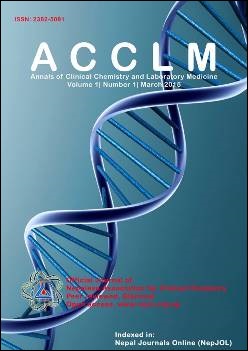Study of metabolic syndrome in postmenopausal women
DOI:
https://doi.org/10.3126/acclm.v1i1.12307Keywords:
Metabolic syndrome, postmenopausal womenAbstract
BACKGROUND: Various studies throughout the world have documented higher prevalence of Metabolic Syndrome (MS) and CV risk factors in postmenopausal women. Abdominal obesity, a key component of metabolic syndrome is quite prevalent in South Asian women. However, studies that have investigated the effect of menopause on the health status of Nepalese women is lacking.
METHODS: This cross-sectional study was conducted in TUTH, Kathmandu Nepal. Forty five each premenopausal and postmenopausal (defined by cessation of menstruation for ≥12 months) women visiting the General Health Checkup Unit were enrolled as participants. Metabolic syndrome was defined by IDF criteria. BP, height, weight and WC were measured and BMI was calculated while fasting blood samples were analyzed for serum biochemical markers: FBG, lipid profile.
RESULTS: This study found higher prevalence of MS in postmenopausal women (57.8%) in comparison to premenopausal women (20%). 13.3% were diabetic, 23.3% were hypertensive, 82.2% had abdominal obesity (WC>80 cm), 43.3% were overweight (BMI 25-29.99 Kg/m2) and 13.3 % were obese (BMI≥30 Kg/m2). WC, BMI and SBP were significantly higher in postmenopausal group. Among the biochemical markers, FBG, TC, LDL-C, TG were significantly higher whereas HDL-C was significantly lower in postmenopausal women than in premenopausal women.
CONCLUSION: MS was highly prevalent in postmenopausal women. This is an indication of taking necessary preventive measures so that the risk of developing diabetes and cardiovascular disease can be minimized in the postmenopausal group.
DOI: http://dx.doi.org/10.3126/acclm.v1i1.12307
Ann. Clin. Chem. & Lab. Med. 1(1) 2015: 6-11
Downloads
Downloads
Published
How to Cite
Issue
Section
License
Authors who publish with this journal agree to the following terms:
- The author transfers copyright to the Nepalese Association for Clinical Chemistry.
- The journal publishes the work under a Creative Commons Attribution License that allows others to share the work with an acknowledgement of the work's authorship and initial publication in this journal and under the same share-alike license used here.
- Authors are able to enter into separate, additional contractual arrangements for the non-exclusive distribution of the journal's published version of the work (e.g., post it to an institutional repository or publish it in a book), with an acknowledgement of its initial publication in this journal.
- Authors are permitted and encouraged to post their work online (e.g., in institutional repositories or on their website) prior to and during the submission process, as it can lead to productive exchanges, as well as earlier and greater citation of published work (See The Effect of Open Access).




